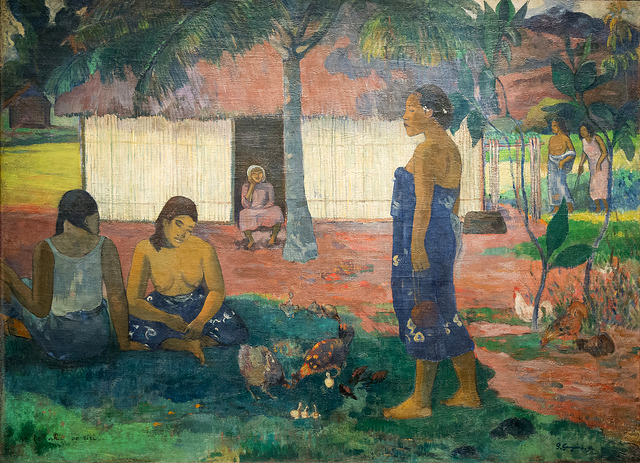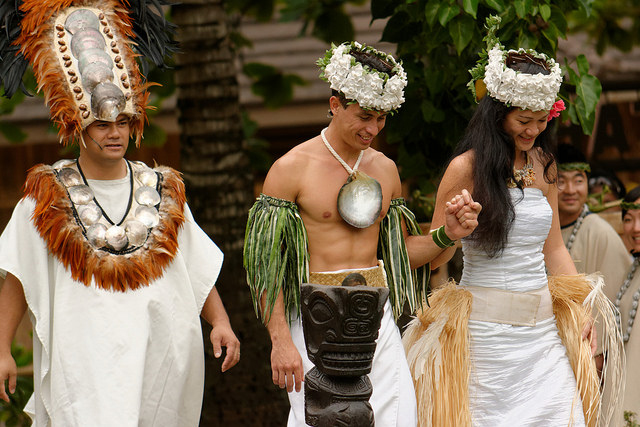Teachers at the University of French Polynesia have been telling their classes that their Polynesian languages are in danger, so the students studying Tahitian decided to take action. According to a story in a major Polynesian news source on February 16, students studying reo mā’ohi (the language of the Tahitians) highlighted the different Polynesian languages at the campus in Puna’auia, a suburb of Papeete, during the 10th year celebration of Polynesian Day on the 15th.

The students are afraid their languages will be forgotten. “If we do nothing, they will disappear,” a 2nd year student of Tahitian said to the reporter, in the words of the Google translation. So they emphasized the language in the dances, the sketches, and the orero, the traditional storytelling by a trained public speaker during the festivities.
The students expressed their awareness of the differences in the uses of the Polynesian languages. Tevivi Amaru, from Tuamotu, said that at home they all speak pa’umotu in their family circles. However, the ones from the Marquesas regret that their reo’enana is not used nearly as much as reo tahiti. Warren Huhina, who is studying applied foreign languages at the university, told the reporter that speakers of Tahitian are lucky by comparison with other Polynesians since their language is spoken widely. As evidence, he pointed to the university itself, which teaches Tahitian.

Heiani Temanupaioura said that many young people lack the motivation to learn their Tahitian. She believes that some are even ashamed to speak it. She says she doesn’t understand such a reaction. She has spoken Tahitian since she learned it at home from her grandparents and at her Sunday school. She is clearly proud to be a student in the reo ma’ohi program.
Another student, Mirose Paia, blamed the general lack of motivation and commitment to Tahitian on the presence of the foreign languages in the lives of the students. She advised students to return home to their islands and continue practicing not only their native languages but also their traditional customs. The brief news report concludes on a hopeful note, however: enrollment in the reo ma’ohi program at the university continues to grow.
While the recent news story provides a commendable range of opinions on the importance of retaining Tahitian, it does not go into the fact that the construction of their language has helped to foster and preserve their peacefulness. Robert I. Levy focuses on the ways the language reinforces their nonviolent values in a number of his publications. Citing just a couple of them will give a better sense of the critical importance of this language to those traditions.

In his 1969 article “On Getting Angry in the Society Islands,” Levy points out that the Tahitian word for anger is riri, a feeling that arises, for them, in the abdomen. Once this feeling arises, it is thought over in the head as feruri. There are other words for rage, irritability, and the like, and an examination of 301 words for states of feeling in an early Tahitian dictionary shows that 47 refer to anger. Out of those 47 words, 12 are trustworthy terms for anger, though only 3 were still in use when Levy was there.
Despite this contraction in the variety of emotion words for anger, the anthropologist continues, it is still “hypercognated” in comparison to words for other feelings, such as loneliness. Anger is always viewed as bad in Tahitian. Some words have double meanings, such as “to beat up” also means “to kill,” and the word for “unconscious” also means “dead.” Thus, an expression of violence carries the anxiety that the degree may be extreme.

Levy also analyzed the importance of positive words for affection for the Tahitians. In his landmark 1973 book Tahitians: Mind and Experience in the Society Islands, he writes that the Tahitian word for love, here, emphasizes an active feeling for a relationship. For couples, it carries the implication that they want to be together, to do things together, both with their minds and their bodies. A man, caught in a situation of eating a meal away from his home, would want to take food back to his wife.
Levy quotes from his informants for several pages but a brief extract will give a flavor of the importance to them of their own understanding of love. When the anthropologist asks Manu if he and his wife still love one another, the man replies, “Yes, if we didn’t love each other, our life would not be going properly….If only I hered Tetua, and she did not here me, then she would go and do the things that she desired …” She would tend to ignore him and vice versa, he explains (p.318).
A man who only desires a woman physically, even when he lives with her, doesn’t have a proper feeling of here for her unless he completely focuses his thinking on her. Here is clearly different from and much more than just a desire for sex. The word may also be used for parent-child, sibling, and friendship relationships, since it may apply to actions and actual behaviors rather than simply to intentions.
Whether or not the students in the University’s reo ma’ohi program are aware of Levy’s arguments about the value of their language for fostering their peacefulness probably does not matter too much. The important news is that they are doing something to preserve their spoken Tahitian.